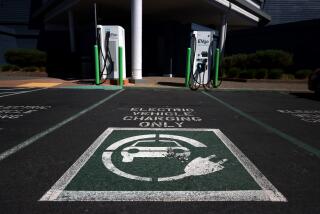SUVs Can Guzzle Less
- Share via
Since 1975, when Congress last raised vehicle fuel economy standards, manufacturers have rolled tens of millions of vehicles onto the road. Huge numbers have been gas-guzzling “light trucks”--SUVs, minivans and pickups more likely to carry commuters than hay bales, yet absurdly exempt from passenger-vehicle fuel standards.
The 2000 model year saw overall average fuel economy slip to 24 miles per gallon, lower than any time since 1980. Just about everyone agrees that the long-frozen standards, averaging 27.5 mpg for passenger cars and 20.7 mpg for light trucks, have to be raised. But the House energy subcommittee’s proposed fix of these antiquated standards is of the duct tape and wishful thinking variety.
The approach endorsed by the Republican leadership leaves it to federal transportation officials to determine how to improve SUV mileage. It hopes to reduce gasoline consumption by 5 billion gallons between the 2004 and 2010 model years. While that sounds like a lot, it amounts to less than 1% of the projected gasoline demand for the period. Even the industry has conceded it can do better.
Sen. Dianne Feinstein (D-Calif.) is among those convinced that auto makers can make SUVs that go considerably farther on each gallon. She’s co-sponsoring a bill to require SUVs to meet the same 27.5 mpg standard as passenger cars. The industry says that’s unrealistic. Yet when pressed, car makers usually can achieve more than they said they could.
Manufacturers are unlikely to exert themselves except under the spur of firm goals and deadlines, to which the Bush administration is hostile. That leaves it up to Congress to make responsible repairs on the outdated and inadequate fuel economy standards.






